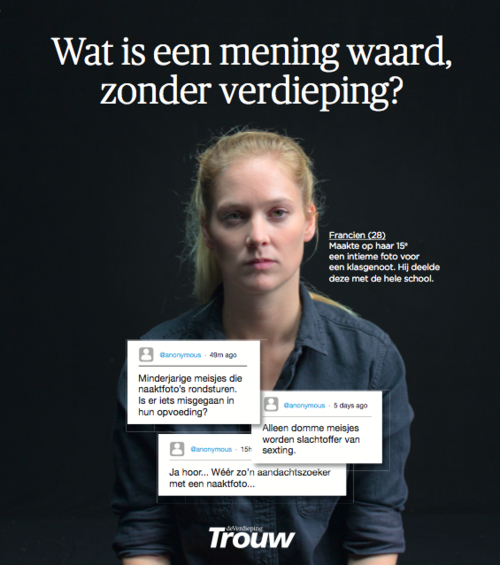In the last decade the amount of people using social media has grown tremendously. I believe that all this sharing on the internet has changed our culture. People nowadays share pictures and opinions so easily on the internet without really thinking about the consequences. In most cases you don’t have to, but in the case of sexting you do. I’ve had several pictures of naked girls that have been send to me by friends in Whatsapp groups. Many people consider forwarding these pictures wrong, but who is to blame?
Sexting happens a lot and it doesn’t always end badly. People have their own reasons to send nude pictures to their boy(girl)friends. They trust that the receiver will keep this picture for him(her)self as the picture is meant for their eyes only. But when the receiver breaks this trust and sends the picture to other people, these things tend to go viral. This is the last thing the sender wants. For the world to see the senders private parts and not being able to erase the images.
At this part a problem evolves for the sender, but who is causally and morally responsible for the problem?
The sender: You can’t argue that the person sending nude pictures to someone else, is not causally responsible. If they didn’t make the picture in the beginning and send it to someone, there would have never been a problem. The discussion is often more about the moral responsibility of the sender. In most case the sender trusts the receiver to look at the pictures and not sending them to anyone else. If there is no trust, I wouldn’t think anyone would send inappropriate pictures to anyone. I think the moral responsibility depends a lot on the trust-bond. If there is a high level of trust, then you can’t say the sender is fully moral responsible for photo leakage. When there is a (very) low trust-bond, then I do think the sender is fully moral responsible.
The first receiver: Usually, I believe, sexting happens between just 2 people. The sender and the receiver. In this one to one situation I call the receiver the “first receiver”. This person has now pictures of someone else, but is in a sense free to do whatever he wants to do with them. You can argue that the true problem of nude pictures going viral starts here. If this person decides to break the trust-bond and sends the pictures to someone else, I don’t care to how many other people, I find this person fully causal and morally responsible even if this person has another trust-bond with the second receiver!
The second receivers: These people had nothing to do with the sexting in the first place, but now have some naked photos of a girl (or guy). Of course there are third and fourth and fifth receivers, but that doesn’t matter. They all have in common that they received nude pics from someone other than the person who send them these. A lot of these people tend to forward these pictures in different groups making it a problem of the many hands.
By sending the pictures I think they are morally responsible for creating the problem. Although they might not know the person in the picture, they do know what kind of consequences the leakage of these pictures can have for this person.
I do have my doubts about these people being also causally responsible for the problem. In my opinion the problem started when the first receiver forwarded the pictures. The second receivers are the ones that create the size of the problem. Therefore you can say they are somehow causal responsible for the problem, but since they didn’t start the problem, I say they are not.
Therefore I disagree with people that say that you can only be morally responsible if you are also causally responsible. I believe one can be morally responsible for something, but not truly causally. The last party connected to the problem is a clear example of that in my opinion.
The social media: in my opinion the social media is morally responsible, but in no way causal. Since this problem makes play on social media, I argue that they are morally responsible for the problem. I believe that SM has to make at least an effort to help solving/preventing the problem. Facebook and YouTube use technology to prevent pornographic and erotic appearing on their websites. I think SM like WhatsApp (which is owned by Facebook) can also make use of these technologies. I think they could create an option that, when you send a picture to someone, WhatsApp askes you if you would like the receiver being able to forward this picture. This ensures that once the picture is send to someone, the receiver can’t forward it to other on WhatsApp. Of course this would not solve the problem completely, but at least in this way WhatsApp contributes in preventing the problem. I believe they can do such a thing and that they are moral obliged to create this technology. That would be a great Responsible Innovation in my opinion.
